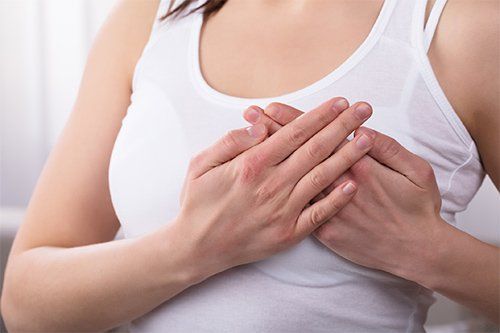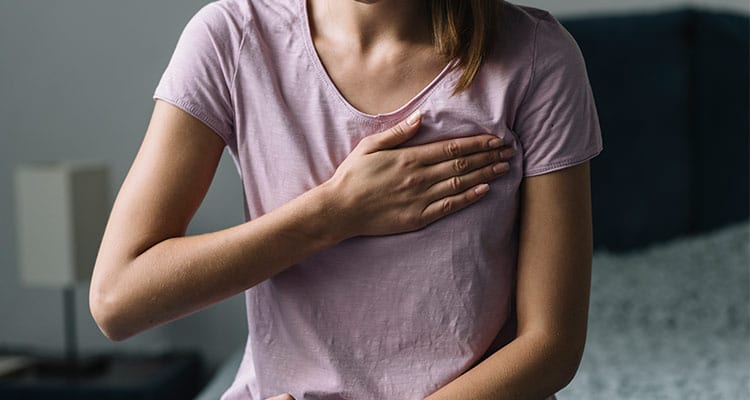This image is a digital painting or stylized artwork depicting a couple sharing an intimate moment. The artwork is characterized by warm tones, predominantly shades of yellow, orange, and brown, creating a cozy and passionate atmosphere.
If when you make love, your partner DOESN’T KISS YOU it’s because… See more
This image is a digital painting or stylized artwork depicting a couple sharing an intimate moment. The artwork is characterized by warm tones, predominantly shades of yellow, orange, and brown, creating a cozy and passionate atmosphere.

The Truth Behind Body Features and Health: Myths vs. Reality
In the age of the internet, countless myths and misconceptions about the human body circulate daily. One of the most common yet scientifically questionable beliefs is that certain body features indicate hidden aspects of a person’s health, fertility, or even personality. Among these claims is the idea that a woman’s breast size correlates with specific physiological traits, including reproductive health or sexual attributes. But is there any truth to these assumptions, or is this just another baseless myth? Let’s explore the science behind this topic.
Do Larger Breasts Indicate Anything About a Woman’s Health?
Many people assume that larger breasts are linked to higher levels of estrogen, which in turn is associated with fertility and reproductive health. While there is some scientific basis to the idea that breast development is influenced by hormone levels, breast size itself is not a direct indicator of reproductive capability, vaginal health, or sexual function.
Breast size is determined by several factors, including:
- Genetics: A woman’s breast size is largely inherited from her family.
- Hormones: Estrogen and progesterone influence breast growth during puberty and pregnancy.
- Body Fat Percentage: Breasts are composed mainly of fatty tissue, so weight fluctuations can impact their size.
- Lifestyle and Nutrition: Diet and overall health can contribute to breast size, but not in ways that directly link to reproductive health.
Does Breast Size Affect Fertility?
A common misconception is that larger breasts indicate higher fertility. While estrogen does play a role in breast development, it is not the only factor affecting fertility. Women with both small and large breasts can have healthy reproductive systems. Fertility is more closely linked to:
Regular menstrual cycles
Overall hormonal balance
Reproductive organ health
Lifestyle factors such as diet, exercise, and stress levels
Studies have shown that while some men may subconsciously associate breast size with reproductive potential, this is more of a cultural and psychological bias rather than a biological fact.
What About Sexual Health and Vaginal Characteristics?
The idea that breast size correlates with vaginal health or tightness is a complete myth. Vaginal elasticity is influenced by factors such as genetics, childbirth, and muscle tone, but not breast size. Some people believe in outdated notions that link body proportions to sexual experience, but these ideas are rooted in misinformation rather than science.
The female body is complex, and every woman is unique. No single body feature can determine something as intricate as vaginal health or function. Instead, factors such as hygiene, hormonal balance, hydration, and lifestyle choices play a far more significant role.
Why Do These Myths Persist?
There are a few reasons why these myths continue to circulate:
Cultural Influence: Throughout history, different cultures have associated physical traits with fertility, sexuality, or personality traits. Many of these beliefs are outdated and not based on scientific research.
Media and Misinformation: Social media, movies, and even casual conversations can spread false information, reinforcing stereotypes.
Psychological Perception: People tend to associate physical attractiveness with desirability and other qualities, even when there is no factual basis.
Lack of Education: Many people simply do not receive proper education about human biology and sexuality, leading to the spread of myths.
What Really Matters for Women’s Health?
Rather than focusing on myths, women should prioritize the following for overall well-being:
- Balanced Diet: Proper nutrition supports hormonal balance and overall health.
- Regular Exercise: Staying active helps maintain reproductive and cardiovascular health.
- Routine Check-ups: Seeing a doctor for regular screenings ensures reproductive health is in good shape.
- Self-Care and Mental Health: Stress and mental health significantly impact physical well-being.
Conclusion: Science Over Myths
While people may believe that breast size is a secret indicator of reproductive or sexual health, there is no scientific evidence to support such claims. Women’s health is influenced by a variety of factors, and no single body part can define their overall well-being. Instead of relying on myths, it’s important to educate ourselves with accurate, science-based knowledge.
At the end of the day, every woman’s body is unique, and beauty, health, and confidence come in all shapes and sizes. Let’s focus on what truly matters—self-care, body positivity, and living a healthy life.


In today’s world, there is no shortage of myths and misconceptions about the human body, especially regarding how certain physical features may correlate with aspects of a person’s health. One common belief is that certain body characteristics, like breast size, can indicate hidden physiological traits such as fertility, health. But how much truth is there to these assumptions? In this article, we’ll explore the science behind these myths and debunk the misconceptions surrounding body features and health.
Do Larger Breasts Indicate Anything About a Woman’s Health?
One of the most prevalent myths is that women with larger breasts may have higher estrogen levels, which some believe suggests better fertility and reproductive health. While it’s true that breast development is influenced by hormones like estrogen, breast size itself does not correlate with a woman’s ability to conceive or her overall health.
Breast size is determined by several factors, including:
- Genetics: A woman’s breast size is largely inherited from her family.
- Hormones: Estrogen and progesterone influence breast development during puberty and pregnancy.
- Body Fat: Since breasts are composed mostly of fatty tissue, fluctuations in body weight can affect their size.
- Lifestyle and Nutrition: A balanced diet and good overall health can influence breast size, but this doesn’t have a direct connection to reproductive health.

Does Breast Size Affect Fertility?
The idea that larger breasts are linked to higher fertility is a misconception. Fertility is determined by a broader range of factors, including hormonal balance, overall reproductive health, and lifestyle choices. Aspects such as:
- Regular menstrual cycles
- Reproductive organ health
- Diet and exercise
- Stress management
These factors are more closely related to fertility than breast size. Studies show that while cultural biases may exist, the link between breast size and fertility is psychological rather than biological. There is no scientific evidence to support the claim that larger breasts indicate better fertility.

What About Vaginal Health?
Another myth that persists is the idea that breast size is linked to vaginal health, including factors like tightness or elasticity. In reality, vaginal health is influenced by factors such as genetics, muscle tone, childbirth, and hormonal balance—none of which are determined by breast size.
The health of the vaginal area depends on things like:
- Hygiene
- Hormonal balance
- Hydration
- Lifestyle choices

Why Do These Myths Persist?
There are several reasons why these myths continue to be widespread:
- Cultural Influence: Many societies have historically linked physical traits with fertility, personality. These associations, while long-held, are not rooted in scientific evidence.
- Media and Misinformation: Movies, social media, and casual conversations often perpetuate stereotypes and misinformation. These myths are shared and reinforced through these platforms, leading to widespread belief.
- Psychological Perception: Society tends to associate physical attractiveness with other desirable traits. This psychological bias can lead people to believe that certain body features have more significance than they actually do.
- Lack of Education: A lack of comprehensive education on human biology contributes to the persistence of these myths. Without a solid understanding of the body, many people rely on misinformation.

What Really Matters for Women’s Health?
Rather than focusing on myths and physical characteristics, women should prioritize factors that have a proven impact on their health. Here are some of the most important aspects to focus on:
- Balanced Diet: Proper nutrition supports hormonal balance, reproductive health, and overall wellness. Eating a variety of fruits, vegetables, and proteins is crucial for maintaining good health.
- Regular Exercise: Physical activity helps maintain cardiovascular health, boosts mood, and supports reproductive health by improving hormonal regulation.
- Routine Check-ups: Regular visits to healthcare providers for screenings like pap smears and breast exams are essential for early detection of health issues.
- Mental and Emotional Health: Managing stress and supporting mental well-being are essential for maintaining overall health. Stress management techniques like meditation, therapy, and self-care practices are important for maintaining a balanced life.

Conclusion: Focus on Science, Not Myths
There is no scientific evidence that supports the idea that breast size correlates with fertility, health, or any other hidden aspect of a woman’s health. Women’s health is complex, and various factors—including genetics, hormones, lifestyle, and emotional well-being—contribute to overall well-being.
Instead of perpetuating myths, we should focus on science-based, evidence-backed knowledge. By prioritizing a healthy lifestyle, supporting mental health, and promoting body positivity, we can foster better well-being for women of all body types. It is important to recognize that every woman’s body is unique, and health is not determined by any single physical feature.
Reliable Sources for Further Reading:
- Mayo Clinic – Healthy Lifestyle: Comprehensive information on nutrition, exercise, and overall health. (Mayo Clinic)
- The American College of Obstetricians and Gynecologists (ACOG): Guidance on fertility, reproductive health, and regular screenings. (ACOG)
- National Institute of Health – Breast Cancer and Health: Information on breast health and understanding risk factors. (NIH)
- WebMD – Women’s Health: Covers a variety of topics from reproductive health to mental wellness. (WebMD)
By focusing on accurate, science-based information, we can move beyond myths and better understand our bodies in a healthier, more informed way.



